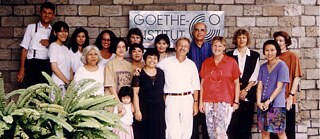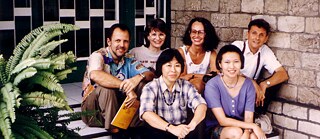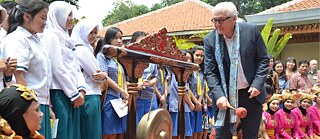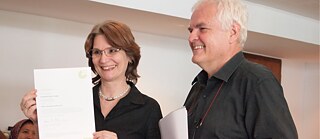Interview
Maria Fischer-Siregar

What made you as a German want to work at Goethe-Institut Jakarta and settle in Indonesia?
It was quite by chance that I came to the Goethe-Institut, and then I stayed for more than 30 years. It was simply a good fit for me, I was able to work exactly at the interface between Germany and Indonesia, which also corresponded to my life situation, and I was able to use my knowledge of both cultures in a meaningful way.
But back to the beginning. At the end of 1983 my Indonesian husband and I and our then 18-month-old daughter moved from Germany to Indonesia. For my husband it was a move back home; for me it was exciting to get to know Indonesia, the culture and the very different kind of life up close. I studied social sciences and education at university, and in Germany I worked as a consultant in youth and adult education.
It was natural for me to work in education here in Indonesia, but I didn’t immediately start looking for a job. In mid 1984, our second daughter was born—I had my hands full with taking care of the children and building our new life. At the same time I wrote articles for an educational journal in Germany, and in this connection I interviewed the Indonesian women’s rights activist Julia Suryakusuma. While we were doing the interview at her home, her husband peeked into the room a couple of times. It was the film director Ami Prijono, now deceased. When he heard that I spoke Indonesian quite well, he invited me to the film evening with the program director of the Goethe-Institut. They urgently needed someone to translate the films into Indonesian and explain the background of the plot. Because of the prevailing censorship at the time, many German films were not allowed to be shown publicly, which is why private screenings were given to a small group of Indonesian filmmakers. As a passionate cinema lover, I welcomed the offer. And so it happened that I translated a few times at these events.
At some point, the program manager called me and said the language department was urgently looking for teachers—would I be interested in teaching German courses? I observed the lessons at the Goethe-Institut and was enthusiastic. After training for teaching German as a foreign language, I took on my own courses beginning 1986. As a native speaker, I taught mainly in special courses and at the higher levels. In addition, I worked a lot training German language teachers at schools throughout Indonesia. From 2002 to 2016 I was responsible for organizing the language courses and examinations at Goethe-Institut Jakarta. After that, I continued to support the Goethe-Institut in the training of new teaching staff, an area that was always close to my heart.
You have had a close relationship with the Goethe-Institut for many years. Can you share some of your experiences during this time? You must have had some ups and downs?
Yes, gladly. There have been many ups and downs over the years about which I could write a whole book. Indonesia has undergone enormous economic, political and social development in the last 35 years, and throughout all these changes there has continuously been great interest in the Goethe-Institut’s language courses and events.
A very difficult time for all of us at the institute were the years 1998 and 1999, the period of political unrest before and after the overthrow of former President Soeharto. At that time, the Goethe-Institut was still located on Jl. Matraman Raya. It was an area where many demonstrations took place: stones flew, tires burned, and shots were fired. On the way to the institute once, I got caught between the fronts and a heavy paving stone hit the car. Fortunately, nothing happened to me. Sometimes we teachers didn’t know how to get home in the evening after classes because fierce arguments were raging outside the building. One evening during a class break, I heard on the radio that students had been shot at again in another area of the city. I went back to the classroom with tears in my eyes and had to pull myself together in order to continue teaching.

Shortly after the political new beginning—it think it was 2001—the Goethe-Institut moved to Jl. Sam Ratulangi, where it still is today. That was a major milestone. We finally had a large, modern event hall, a light-filled library, enough space to accommodate all language courses at one location, and the wonderful inner courtyards where people could meet. The institute’s new domicile opened up many new possibilities, among which was the capacity to host large gatherings for and with artists. They represent the top highlights in my memory. These events entailed week-long preparations in the courses. Teaching staff and course participants rehearsed plays, songs and other musical performances with great enthusiasm and creativity. We often had programs running throughout the day at the same time on two stages, in the event hall and in the courtyard, all busy with trial courses, information about studying in Germany, plus German cakes, sausages and potato salad. The whole institute took part and helped out. At these festivals we often had more than 1,000 visitors in a single day.

Unforgettable also is naturally my internal farewell party a few years ago. A colleague staged a fairytale as a play in which the entire institute staff was on stage, from institute director to office boy, and I was then brought on as “Sleeping Beauty”. For me it was a big surprise and very funny. It was wonderful that really everyone was involved, the whole big “Goethe family”.
If I’m not mistaken, a few years ago you received a Goethe-Institut award as a distinguished employee. Which award was that exactly? Can you tell us more about it?

My role as a mediator, within the institute and beyond, was also mentioned in the justification for the award. Because I move in both the Indonesian and German cultures, I have often been able to bring one side closer to the other and thus bridge differences. Over the years, I had established many contacts with the Indonesian authorities and with other institutions in Indonesia, which was very useful for the work of the institute.
For me, my commitment was a matter of course, and I consider it a very special gesture on the part of Goethe-Institut to recognize the commitment shown by local staff.
And last but not least: What does the Goethe-Institut mean to a Maria Fischer, in the past, in the present or in the future?
The Goethe-Institut is and remains for me a place of life-long learning. That is true for the staff as well as for visitors. I have always seen it as a great opportunity to be able to learn something new all the time, to work on a variety of projects, and to develop personally in the process. You cannot just stand still at the Goethe-Institut; you have to keep apace with social developments. That is a constant challenge, often difficult, but very satisfying.
And learning takes place not only in the classroom, during training sessions and artist workshops, it results above all from the many personal encounters that the Goethe-Institut spaces provide. These encounters with people—whether German, Indonesian or others from anywhere in the world—have often opened my eyes to other perspectives that I had not yet seen.
Thus I wish for myself and for the Goethe-Institut that it will also be possible in the future to create diverse physical and virtual spaces in which people with different experiences, with different cultural and ideological backgrounds, can come together and exchange ideas. In view of the pressing questions of our time, first and foremost the question of how we can and want to live on our planet Earth in the future, I find such meeting venues enormously important. Spaces where we can ask questions for which we do not yet have answers. Where we can generate ideas together and perhaps find answers.
- The interview was conducted by Veriana Devi